
|
|
|
|
|
|
|
|
|
|
|
|
|
|
|
|
|
|
|
|
|
|
|
|
|
|
|
|
|
|
|
|
|
|
|
|
|
|
|
|
Consecration of Fulton J. Sheen
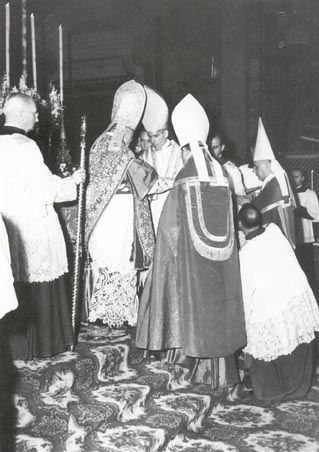
Consecration of Fulton Sheen as Auxiliary Bishop of
New York by Cardinal Spellman
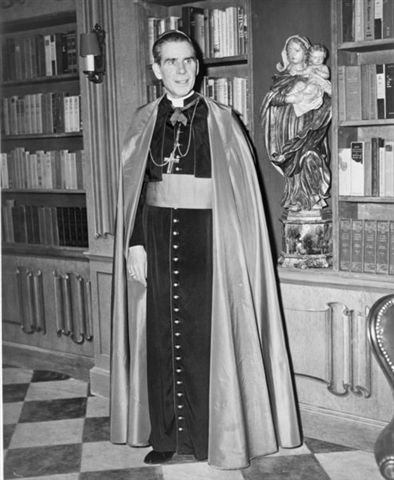
ArchBishop Fulton Sheen
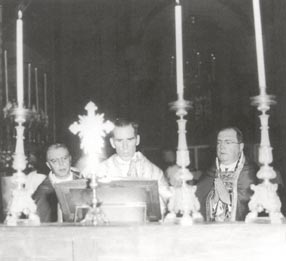
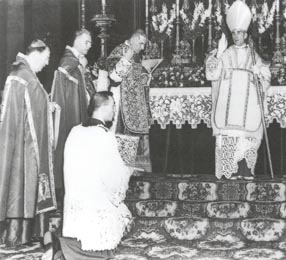
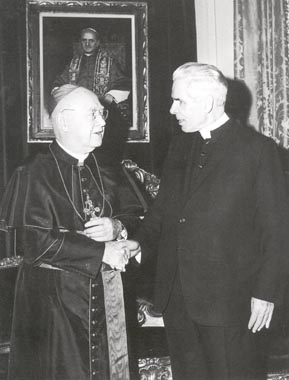
Cardinal Spellman with Sheen
Comments on Ordination
by Bishop Fulton J. Sheen
When the
deacons enter the cathedral to be vested, they wear
an amice, which was originally a white linen kerchief worn about the neck
and the shoulders. When he put it on his head and shoulders, he said
the prayer: "Place,
O Lord, the helmet of salvation on my head to the defeat of diabolical
invasion." Over the
amice, he wears the alb, which was the
original Roman tunic with long sleeves, around the waist of which he
ties the cincture which is the symbol of chastity.
Over the alb is worn a maniple, which in
the early days of the Greeks and Romans was a kind of handkerchief worn on
the left forearm, used at meals for wiping mouth and hands. The consul
during the Roman Empire used it as a sign to start the races in the
circus. The Church first used it to wipe communion vessels and hands in
the celebration of the Mass. The symbolism of the
maniple
is to remind the priest of the
bonds which once held the hands of the Savior. This is
signified in the prayer which is offered when the maniple
is put on, begging that the cares and sorrows of earthly
life should be borne with patience
in view of
heavenly reward.
Now we come to
two vestments which are worn by deacons when they come to
the altar for ordination; namely, the stole and the chasuble. The
stole originally was a loose robe worn by the ancients, and in this sense
the word is still used by the English poets. Thus, Milton
pictures Melancholy as having
"a sable stole of cypress lawn, over her
decent shoulders drawn."
In the Old Testament, the Levites were
described as being clad in stoles when conducting the sacred Ark to
Jerusalem. In the "Book
of the Apocalypse," the
saints
are "clothed in white stoles."
The stole is worn only by deacons,
priests, and bishops, but each wears it in a different way, and it is
associated with sacred orders. When, however, the deacon enters
the Church, the stole is carried only on one shoulder, while over the left
arm the deacon carries a folded chasuble. In the right hand, he bears
a lighted candle, and in the cincture is a linen cloth, which will
eventually be used for tying the hands, after they have
been anointed with oil.
During the ceremony of ordination, the
bishop draws a part of the stole
which rests at the back of the candidate's neck over the breast
and lays the two ends crosswise. The chasuble which he carries
and which is a symbol of charity, is folded at the beginning of the
ordination ceremony, as an indication that the one who wears it is not
a priest. At a later point in the ceremony, the chasuble is unfolded. The
symbolism of this is that, in the first part of the Mass, the deacon
is made a priest and given the power
of offering
sacrifice to
God. In the second part of the ceremony, the chasuble is then let down
when he
is
empowered to preach
and forgive
sins. This indicates the
more complete.
Life Dates | Visitors |
Museum
| Special People |
Holy Mother Mary
St. Mary's Church |
Become a Volunteer | Buy a Book |
Museum Shop
How to Find Us | Our Future |
Our Beginnings | Photo Gallery
| Links | Personal Testimonies
Calendar of Events | Bishop Sheen Quotes |
Inspirational Messages |
Contact
Us | Home
